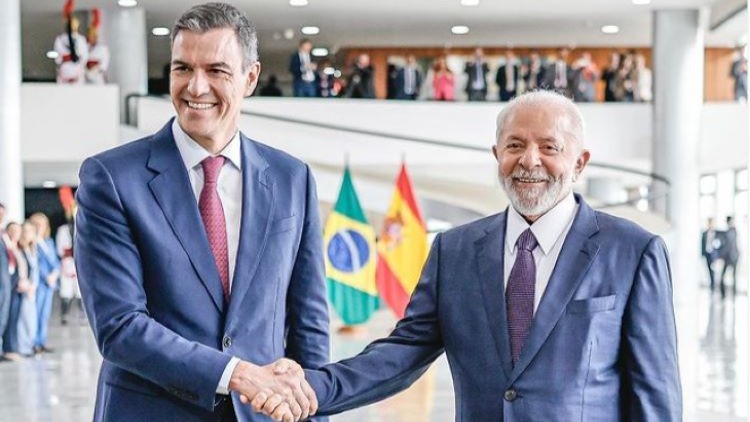Eduardo González
The President of the Government, Pedro Sánchez, and the President of Brazil, Luiz Inácio Lula da Silva, were optimistic yesterday about the closing of the free trade agreement between the EU and Mercosur, despite France’s rejection, and agreed on the need for democratic elections in Venezuela. However, Lula asked the Venezuelan opposition not to imitate the Brazilian opposition and “not to have the habit of denying the cleanliness of the electoral process.”
The agreement between the EU and Mercosur, “in addition to reinforcing our commercial and investment ties, would provide clear social, labor and environmental benefits,” declared Pedro Sánchez during the joint press conference after his meeting with Lula at the Palace. President of Planalto, from Brasilia, within the framework of a tour of South America that will continue today in Sao Paulo, the economic capital of Brazil, and will conclude tomorrow, Friday in Chile.
“After the war in Ukraine, Ukraine has learned the lesson that it must seek new allies and diversify its political and commercial relations,” warned the head of the Executive. Therefore, it is “obligatory, a duty” to reach an agreement between the EU and Mercosur (made up of Brazil, Argentina, Uruguay, Paraguay and Bolivia) not only because it would create “the largest free trade area in the world”, but because it would unite two regions with “similarities” on similar issues such as democracy, human rights and the fight against climate change. “It would be a change even in global geopolitics,” he added.
For his part, Lula assured that the Mercosur countries are “ready to sign the agreement with the EU” for “the good of America, Mercosur and the European Union,” because “we have reached a point where we need it politically.” , economically and geographically.”
To do this, it is necessary to overcome the rejection of the French Government, which demands the inclusion in the agreement of “mirror clauses” to guarantee that products imported from Mercosur comply with the same phytosanitary, environmental and social standards of European producers, as as French farmers also defend. “France has had problems with its farmers for a long time,” admitted Lula. “What reassures me is that the European Union does not depend on France’s vote to close the agreement,” and, therefore, “the European Union can close the agreement and France may not like it,” he added.
Concertation and democracy mechanism
During the press conference, Pedro Sánchez assured that one of the objectives of his trip to Brazil was to “strengthen” the ties between the two countries and “deepen an already excellent relationship.” For this reason, he announced that both governments are going to “institutionalize a permanent consultation mechanism between the Government of Brazil and the Government of Spain.”
Specifically, the two leaders addressed the institutionalization of political relations through the creation of a binational permanent commission and the signing of a joint Declaration to monitor the Renewed Strategic Partnership between Spain and Brazil, which includes a roadmap on different areas of cooperation. (political, economic, cultural or scientific) and a calendar of meetings of different working groups, according to Moncloa sources.
According to Pedro Sánchez, both countries share “visions on very important issues,” with special attention to the need to “defend democracy against extremist attacks.” In that same sense, Lula declared that “Spain and Brazil are two great democracies that face extremism, the denial of politics and hate speech, fueled by fake news.” “Our experience against the extreme right, which acts in international coordination, teaches us that it is necessary to unite all democrats,” he continued. “Brazil and Spain have recorded episodes of racism, racial discrimination and xenophobia, even in football” and, therefore, “only an inclusive social project will allow us to build prosperous, free, democratic and sovereign societies,” he added.
Economic relations
The other main objective of the visit, Sánchez continued, is to “deepen” the “economic relationship.” “Spain is a fundamental destination in the internationalization of Latin American companies and, in turn, Brazil is a very attractive destination for Spanish companies,” he highlighted.
Precisely, the president’s day yesterday in Brasilia began with a meeting with Spanish businessmen “to listen to their priorities and projects related to the Brazilian market, where they play a fundamental role in key sectors,” as he himself declared through the social network. X. Likewise, Pedro Sánchez will participate today in Sao Paulo in a large business forum in which more than 200 companies have already confirmed their participation (of the almost 300 Spanish companies in Brazil, mostly SMEs).
For his part, Lula declared that “Spain is the second country of origin of foreign direct investment in Brazil, with consolidated companies and a stock that is around 60,000 million dollars” and that he had explained “to President Sánchez and the businessmen who accompany him , the opportunities that open up in the areas of infrastructure and sustainability.” “Our countries are taking great steps in the field of renewable energy, a field of cooperation that interests us greatly” because “Brazil’s potential is unlimited to generate electricity from clean sources such as biofuels, wind energy, solar and green hydrogen,” he added.
Venezuela
On the other hand, Pedro Sánchez celebrated, during the press conference, the decision of the National Electoral Council (CNE) of Venezuela to call presidential elections for next July 28. “From Spain we have been defending for years that elections be held in Venezuela” and, therefore, “we hope that they will be held with democratic guarantees,” he declared.
For his part, Lula was “happy” about the news and was convinced that “Venezuela knows that it needs a highly democratic election to regain a space for participation in world forums.” However, he recommended that we wait until the elections are held “to judge whether they were democratic or not” and asked the Venezuelan opposition not to imitate the Brazilian opposition and “not to have the habit of denying the electoral process and cleanliness” of the elections. Likewise, in reference to the opposition leader María Corina Machado, who has been politically disqualified, he recalled that, when he was disqualified in 2018, he named another candidate instead of staying “crying.”
During the meeting with Lula, four memoranda of understanding were signed on science, technology and innovation, health investments and public administration. The day included a lunch offered by Lula to the Spanish delegation and continued with a visit to the Brazilian National Congress, where Sánchez met with the presidents of the Senate and the Chamber of Deputies; and with another visit to the Museum in Memory of Indigenous Peoples.







